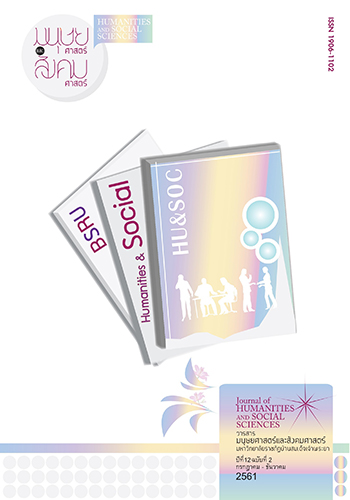A Study of Vegetable Terms in Japanese Language Based on Ethnosemantics
Keywords:
Vegetable Terms, Ethnosemantics, Folk TaxonomyAbstract
This study aimed to investigate vegetable terms and analyze how to build the words that refer to vegetable terms. The framework of study is based on ethnosemantics. The data were collected from dictionary and website in Japanese to relate to review of Japanese food, and analyzed by using componential analysis and folk taxonomy. The results of this study were found the use of terms to differ following the feature of vegetable:1) state of the vegetables ‘s being; 2) the parts of vegetable for eating;3) the preparation of vegetables for cooking; 4)the cooking method; 5) the eating method 6) to eat accompanying with 7) the method of food preservation The 131 words of vegetable terms are analyzed and considered from word formation found that as word used and unused modifiers and loanword. The Japanese vegetable words were reflected world view and the system of Japanese thought, belief, the way of life.
References
โคคุไซ นิฮอนโงะ เคนคิวชะ. (2548). 12 เดือนในญี่ปุ่น. กรุงเทพฯ : ภาษาและวัฒนธรรม.
ชุมพล ธีรลดานนท์. (2549). เดินบนวิถีญี่ปุ่นศตวรรษที่ 21. กรุงเทพฯ : รามาการพิมพ์.
พรรณพิไล นาคธน. (2543). หน้าต่างสู่โลกกว้างญี่ปุ่น. กรุงเทพฯ : หน้าต่างสู่โลกกว้าง.
มณฑา พิมพ์ทอง. (2543). ธรรมเนียมญี่ปุ่น. กรุงเทพฯ : โรงเรียนสมาคมเทคโนโลยี (ไทย-ญี่ปุ่น).
ยูชิดะ ทามาโอะ. (2538). รวมสำนวนญี่ปุ่น. กรุงเทพฯ : สมาคมส่งเสริมเทคโนโลยี (ไทย-ญี่ปุ่น).
ราชบัณฑิตยสถาน. (2546). พจนานุกรมฉบับราชบัณฑิตยสถาน พ.ศ.2542. กรุงเทพฯ : นานมีบุ๊คส์พับลิเคชั่นส์.
สุธาทิพย์ รัฐปัตย์. (2558). การศึกษาคำเรียกพืชผักในภาษาเขมรมาตรฐานตามแนวอรรถศาสตร์ชาติพันธุ์. วิทยานิพนธ์ปริญญามหาบัณฑิต. สาขาวิชาภาษาศาสตร์ มหาวิทยาลัยมหิดล.
อิกาวา ทึซูโมโต และคณะ. (2541). กระจกส่องญี่ปุ่น. (พิมพ์ครั้งที่ 2). กรุงเทพฯ : สมาคมเทคโนโลยี (ไทย - ญี่ปุ่น).
ฮิโรตะ ชิเอโกะ. (2553). สิ่งมงคลญี่ปุ่น. กรุงเทพฯ : แอทมี พรินติ้ง.
Berlin, B. & Kay, P. (1969). Basic Color terms: Their universality and evolution. Berkeley : University of California Press.
Frake, C. O. (1980). Language and Culture Description: Essays. Standford. Calif : Standford University Press.
Lehrer, A. (2009). Wine and Conversation. (2nd ed). New York : Oxford University Press.
Nida, Eugene A. (1979). Componential Analysis of Meaning : An Introduction to Semantic Structure. (2nd ed.). Paris : Mouton Publisher.
Ullmann, Stephen. (1977). Semantics An Introduction to the Science of Meaning. Oxford : Basil Blackwell.
今田慈子[Imada Shigeko] (1993)『発音』凡人社.
新村出[Shinmura Izuru] (1998)『広辞苑』第5版 岩波.
山川史郎[Yamakawa Shirō] (2011)『小学館の図鑑・植物』小学館.
田村佶[Tamura] (1997)『学研の図鑑・植物』学研.
松村明[Matsumura Akira] (1995)『大辞典』第2版 三省堂.
野菜ナビ[Yasai Nabi](n.d.) Retrieve from http://www.yasainavi.com/survey-2017-9/旬の食材百科[Shun No Shokuzai Hyakka] - FoodsLink.jp
フーズリンク(n.d.)Retrieve from http://foodslink.jp/syokuzaihyaka/index.htm/survey-2017-9/
厚労省[kōrō-shō](2012)日本人が一番食べる野菜は何か (n.d.)Retrieve from http://news.tbs.co.jp/newseye/
Downloads
Published
How to Cite
Issue
Section
License

This work is licensed under a Creative Commons Attribution-NonCommercial-NoDerivatives 4.0 International License.




